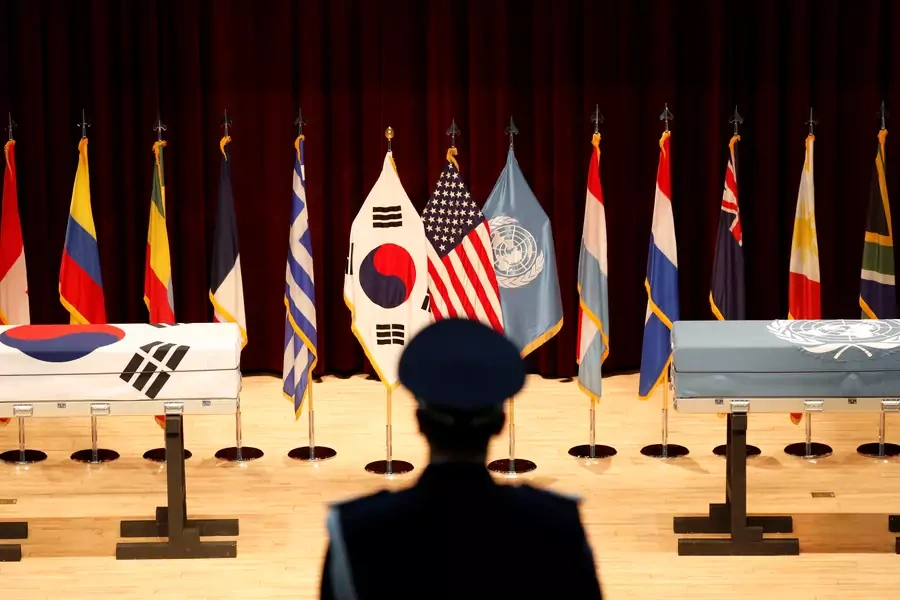Let the UN Command Remain a Tool for Korean Peace

This post is authored by Ben Sando, foreign policy intern at the National Assembly Research Service in Seoul, South Korea. It is part of a project conducted by the program on U.S.-Korea policy at the Council on Foreign Relations, supported by the Smith Richardson Foundation and Korea Foundation. This series of posts addresses the transition of operational control (OPCON) on the Korean Peninsula.
In Colonel (Ret.) David Maxwell’s comprehensive blog post outlining unresolved issues in the transition of operational control (OPCON) on the Korean Peninsula, he remarks that “There is a fundamental lack of understanding of the OPCON transition. Press, pundits, and partisan politicos on both sides of the Pacific are unaware of the history, plan, intent, and necessity of the transition.”
More on:
Maxwell is right to articulate that the OPCON transition debate is peppered with Korean and American misunderstandings. Maxwell’s five-point communications plan to tackle these misunderstanding is well-considered, and I would suggest one additional topic of focus. This would be a deliberate communications effort to settle the disagreement over the role of the United Nations Command (UNC) after the OPCON transition, and to clarify that the UNC will continue its vital armistice-management activities after the OPCON transition occurs.
In 1978, the UNC handed over its operational command authority to the Combined Forces Command (CFC) and became an organization principally charged with the maintenance of the 1953 armistice agreement. The UNC retained the authority to set rules of engagement in the Demilitarized Zone (DMZ), and could assume command of South Korean border forces in crisis-management situations, such as North Korean border provocations that are not sufficiently severe to void the 1953 armistice. The UNC has since exercised this authority to de-escalate numerous border provocations, including the 2010 North Korean artillery attack on the South Korean island of Yeonpyeong. ROK commanders reportedly desired to escalate the Yeonpyeong attack through a disproportionate response, but UNC directives, following the UNC’s doctrine of proportional reactions to provocations, limited the retaliation of ROK forces and contained the Yeonpyeong skirmish to a one-day crisis.
Underscoring the importance of the UNC, the ROK and U.S. defense ministers affirmed in the 2018 Security Consultative Meeting that the UNC would remain intact after the OPCON transition. It appears, however, that the U.S. and ROK are not in agreement over the role that the UNC will play after the transition. During a fall 2019 military exercise to test the post-OPCON transition command structure, the ROK Joint Chiefs of Staff reportedly opposed the U.S. assertion that, post-OPCON transition, the UNC would retain its authority to issue directives to ROK forces in situations of border crisis de-escalation. This dispute was picked up by left-wing Korean media outlets, with Hankyoreh falsely characterizing the American assertion as an effort to “expand the UNC’s mission” after OPCON transition. The dispute also ignited latent Korean concerns that the United States is retooling the UNC to become a backdoor command structure capable of subverting a ROK-led CFC. As the Korea Herald writes, “the US would use the US-led UNC to maintain its power.” The isolation of these reports to left-wing media is indicative of the level of distrust that the Korean left retains for the U.S. military.
Within the Korean defense policy community, there are experts who present legitimate criticisms of the strategic value of the UNC in armistice-management. The UNC, such experts argue, acts as a muzzle on ROK border forces, eliminating the threat of disproportionate retaliation that could deter the North from engaging in minor provocations. However, other factors might explain the trend in North Korean provocations. One possible explanation begins with the implicit recognition that war between the North and South would almost certainly turn nuclear. Thus, either side can carry out minor provocations against the other without such provocations ever being realistically construed as a signal that the aggressor aims to initiate nuclear war. Combined with the antecedent conditions of geographical adjacency and political payoffs from provocation, minor skirmishes are to be expected. India and Pakistan, which both retain operational control of their armed forces, serve as a good model for comparison. Meanwhile, South Korean defense experts should take heed of the positive strategic benefits of the UNC’s de-escalatory role. South Korean leaders can save face in the de-escalation of border provocations by claiming their hands were tied by UNC directives. Without the constraints offered by the UNC, ROK leaders might escalate border conflicts to secure domestic political payoffs, raising the overall risk of war.
Maxwell’s five-point communications plan for the OPCON transfer should include an additional prescription: “the UNC will continue to carry out its unique armistice-management responsibilities.” Such outreach should be complemented by the addition of South Korean officers to UNC ranks. The invitation has been outstanding for some time, but South Korea has yet to dispatch any personnel. ROK officers joining the UNC would have the two-fold effect of legitimizing the UNC’s armistice-management efforts, while dispelling rumors that the UNC is being retooled for backdoor American command of the Korean military.
More on:
 Online Store
Online Store